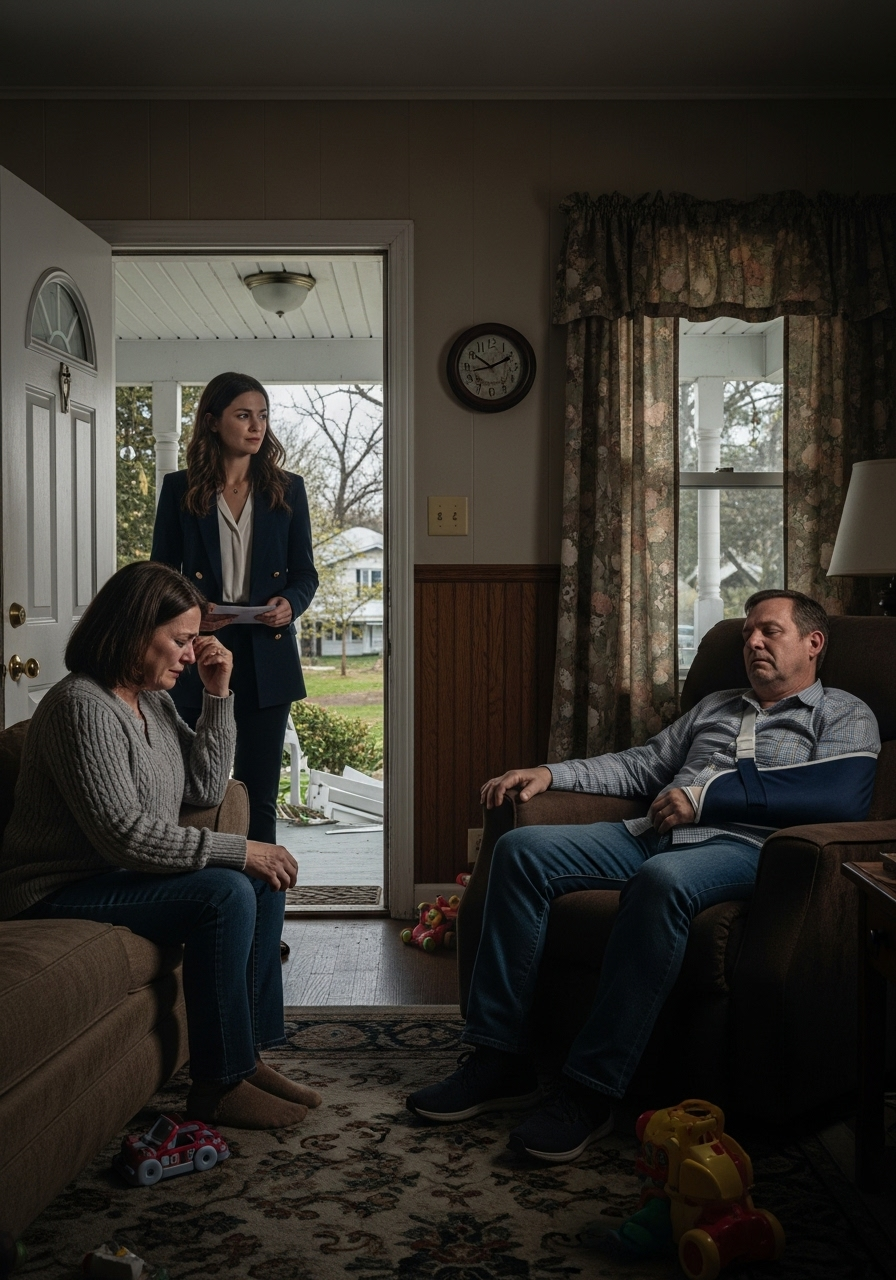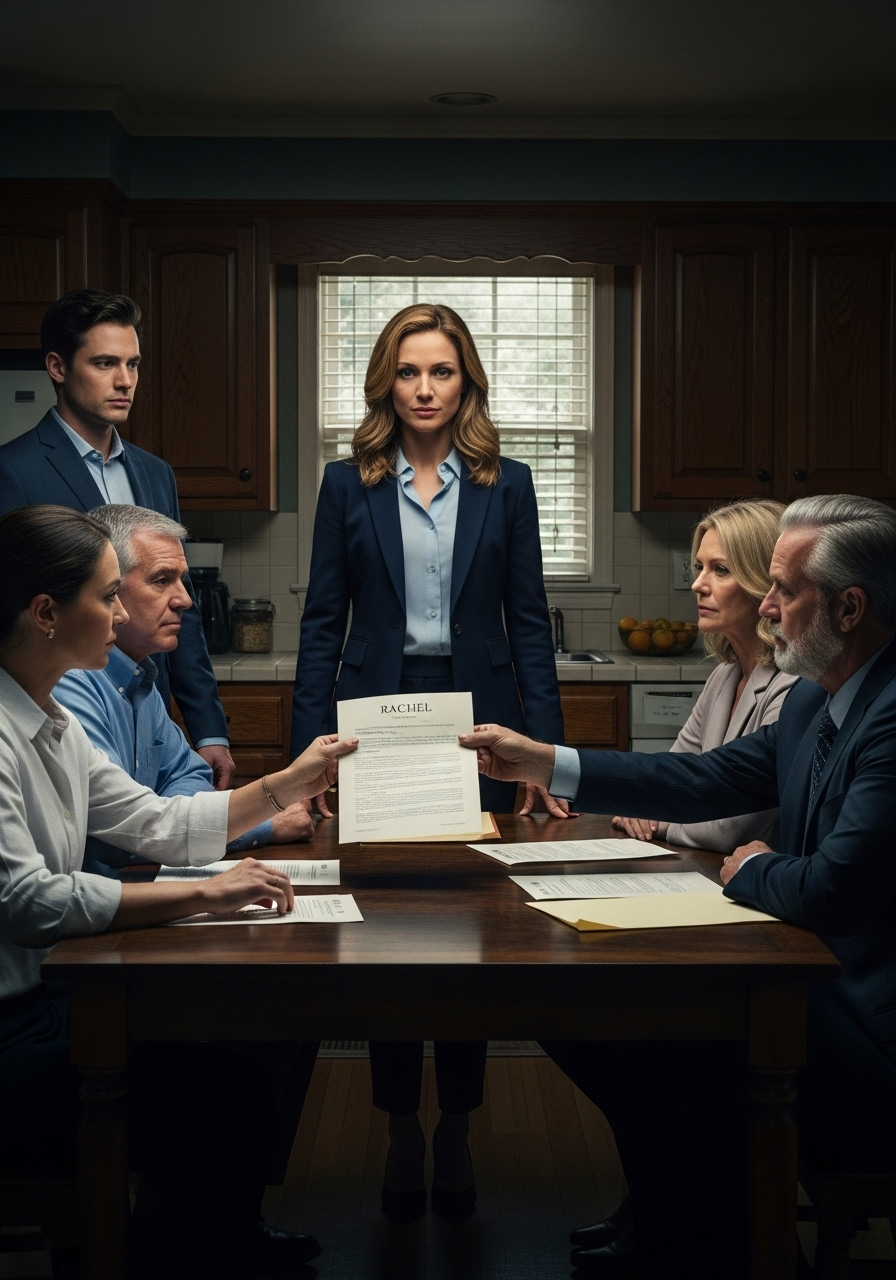“Everything will go to Mark and his kids. You won’t get a single cent!” My mom’s voice was firm as she handed me their new will. I simply smiled in response. “In that case,” I replied, “don’t expect a single cent from me either.” I left and finally took the steps I should have taken years ago. From that moment, their lives changed dramatically.

My name is Rachel, and I can’t even remember the last time I felt like I belonged in my own family. Growing up, I always sensed I was the background character in someone else’s golden script. My brother Mark, he was the star, the golden boy, the apple of my parents’ eye. He didn’t just walk through life— he floated on a cushion of praise, second chances, and open wallets. Meanwhile, I felt like I had to earn every inch of space I took up. Every grade, every trophy, every quiet act of support went unnoticed.
By the time I turned 11, I’d already figured out that our family ran on a very specific currency—Mark’s charm. Hea could do no wrong, even when he absolutely did. I remember one Christmas when I had saved up my little allowance to buy mom a hand cream set she’d once admired at the pharmacy. Mark, on the other hand, completely forgot. The morning of, he scribbled “I love you, Mom” on a folded napkin and handed it to her like a joke. She wept, called him thoughtful beyond his years, didn’t even glance at the gift I had wrapped with care and hidden under the tree for a week.
It wasn’t about presence. It was about being invisible.
I moved out at 18, got a scholarship for mechanical engineering, and never looked back. I worked part-time jobs, studied harder than I thought possible, and graduated with zero debt and a world of options. Eventually, I started my own product design firm specializing in eco-friendly packaging. My work got noticed, then picked up by a few major retailers. Then, it took off. Not a billionaire story, just success built with long nights and quiet resilience. And still, they never asked about it.
Family gatherings, if I made the mistake of attending, were always about Mark and his latest real estate idea. Never mind that half of them failed or barely broke even. My parents would sit beside him at the dinner table like cheerleaders with matching jerseys.
“Oh, your brother just knows how to dream big, Rachel. You should try that sometime. Dream big.”
I was running a successful company, employing people, paying taxes, and helping nonprofits. But because I didn’t brag or flaunt, they assumed I was coasting through life in mediocrity. Still, despite the bitterness that clung to me like smoke after a fire, I visited them. I checked in. I sent money when dad was in and out of hospitals for a year. Covered mom’s medication when her insurance lapsed. And when Mark’s oldest kid needed a laptop for school, guess who helped? Not Mark. Not the golden boy. Me.
I never threw it in their faces. I did it because that’s what family is supposed to do. At least, that’s what I thought.
Then, one afternoon, it all shifted.
It was a gray Thursday in March. I’d come straight from a client meeting, still in a navy blazer and heels, when mom called and asked me to stop by. She said it wasn’t urgent, but her voice had that high-pitched, forced calm she always used when something was definitely wrong.
I arrived to find her sitting with dad at the kitchen table, a neat stack of papers in front of them. Mark was there, too, lounging like a guest of honor with his sleeves rolled up and that smug smirk I’d come to associate with bad news.
“Sit down, Rachel,” Mom said. Her tone was overly polite, the way someone speaks when they’re about to betray you but want to pretend it’s reasonable.
Dad cleared his throat and slid the top paper toward me. It was a new will. I blinked.

“Is everything okay?”
Mark looked like he was barely suppressing a laugh.
Mom answered, “We’ve updated our estate plan. Just wanted you to be aware. Everything will go to Mark and his children.”
I stared at her. She continued, “We feel it’s best. They have a lot going on— a mortgage, private school for the boys, their future to secure. You’re stable. You don’t really need help.”
“You won’t get a single scent,” Mark added, like he was announcing a game score.
“It’s just logical.”
I didn’t yell. I didn’t cry. I didn’t even flinch. I smiled. A strange calm washed over me as I pushed the paper back toward them.
“Then don’t expect a single scent from me,” I said quietly. “Ever.”
Mom blinked, caught off guard.
“Sweetheart, that’s not—”
“No,” I cut in gently. “Let’s be honest. This isn’t new. It’s just finally on paper.”
Mark scoffed, but I ignored him. I stood up, took one final look around the kitchen— I once helped repaint when mom broke her wrist— and walked toward the door.
“Where are you going?” Dad asked.
“I’m doing what I should have done a long time ago,” I said without turning back. “I’m done.”
I left. No tears— just a weight lifted.
But what I didn’t realize in that moment was how deeply my absence would shake the foundation they had built around me.
Over the next few weeks, I changed everything. I stopped the automatic payments for their utilities, the ones they never acknowledged but always expected. I called the pharmacy and removed my card for mom’s prescriptions. I canceled the emergency contact status I had at the hospital for dad. I sent polite emails to each party explaining that I was no longer financially responsible or available. I even removed myself from the shared family emergency phone plan I’d been paying for. It felt cold, but also necessary.
At first, silence. Then a storm. Calls from mom, then dad, then Mark, all ignored. I changed my number, blocked them all. I needed distance— not just geographic. Emotionally, mentally, I needed air.
About a month later, I heard from my cousin Lindsay, who had always been the one person in our extended family who saw through the nonsense.
“They’re freaking out,” she said over coffee. “Your mom said the power got shut off last week.”

I sipped my tea.
“I guess that’s Mark’s problem now.”
Lindsay raised her eyebrows.
“You okay?”
I nodded.
“Actually, yeah. For the first time in years, I’m not being used.”
That summer, I bought a new house on the coast, something simple, modern, peaceful. I hired a business manager, took fewer clients, and finally had time for art again. I started painting in the mornings, watching the ocean roll in like clockwork. And slowly, I healed.
But the story wasn’t over. Not for them. Not yet.
Three months had passed since I walked out of my parents’ house and into a life that finally felt like mine. I hadn’t spoken to any of them since. Not mom, not dad, and certainly not Mark. The silence at first had felt foreign, like a room once cluttered, now echoing with emptiness. But as the days stretched on, that silence became comfort— space to think, to breathe, to exist without constantly explaining or justifying my worth.
Then, out of nowhere, I got a letter. Not an email, a real letter in my mailbox, handwritten in my mother’s neat cursive. I opened it slowly, half-expecting bitterness or guilt-tripping. But what I found was something else entirely.
Dear Rachel,
I know you probably don’t want to hear from me. I wouldn’t blame you if you threw this letter away, but I needed to try. Things have changed since you left. Mark lost his job again. The market took a turn, and two of his investments collapsed. He and the kids are now living with us and it’s been hard. Your father’s health has gotten worse. He had a fall last week and the hospital wouldn’t let me speak to anyone because you’re no longer listed as our emergency contact. I’m scared, Rachel. And I miss you. I miss your steadiness, your kindness, your presence. I wish I had said that more often. Please write back or call or don’t. Just know that we’re thinking of you.
Love, Mom
I sat with that letter for a long time. The Rachel of four months ago would have jumped into action, sent money, offered support, flown back into the storm like a moth to the same flame. But I wasn’t her anymore.
I talked it over with my therapist that week, explained the letter, the guilt it had stirred, the ache I still felt despite everything.
“What do you want, Rachel?” she asked me.
That question hung in the air. Not what they wanted, not what was expected. What did I want?
I didn’t know yet. So, I waited.
A week later, I received another message. This time from Lindsay.
“Your mom called me crying. Mark’s in a mess. Your dad’s back in the hospital, and no one knows what to do. She asked if you’d consider coming, even just to visit.”
I read it twice and still didn’t move until later that night when I sat by my window, looking out at the waves. Something in me whispered, “Closure doesn’t always look like distance. Sometimes it looks like truth.”
So, I made a decision.
I didn’t pack a suitcase. I didn’t bring gifts. I just got in my car and drove.
When I pulled up to the house, it looked smaller than I remembered. Like time had chipped away at the grandeur I used to see as a child. Mark’s SUV was in the driveway. The front yard was overgrown. The porch light broken.
I rang the bell. Mom opened the door and for a second, she just stood there— mouth open, hand to her chest like she was afraid I might disappear.
“Rachel,” she said softly.
“Hi, Mom.”
She stepped aside without a word, and I walked in. The living room was a mess. Toys on the carpet, fast food bags on the coffee table, and dad asleep in a recliner, his arm in a sling. Mark was nowhere in sight, but I could hear the kids fighting upstairs.
“I didn’t expect you to come,” she said, closing the door behind me.
“I didn’t either,” I replied honestly.
She sat down slowly.
“I wasn’t lying. It’s been bad,” she continued. “I figured I didn’t write to get money out of you, Rachel. I swear.”
“I know,” I said. “But if we’re being honest, you didn’t just cut me out of a will, Mom. You cut me out of your heart years ago.”
She flinched.
“That’s not true,” she whispered. “Isn’t it?”
She looked away, hands trembling.
“We just thought Mark needed more. And I didn’t. You were strong, independent.”
“Strong doesn’t mean I didn’t need love or recognition or fairness,” I said gently.
Tears welled in her eyes. “I didn’t know. I really didn’t.”
“I think part of you did,” I said gently. “But it was easier to believe I’d be okay on my own because that let you off the hook.”
Silence. Not cold, just full.
“I’m not here to rescue anyone, Mom,” I added. “I’m not here to fix things. I came because I needed to say the things I never said.”
She nodded, wiping her eyes.
“That’s fair,” she said.
“And if dad wants to see me, I’ll sit with him. But I won’t pretend like nothing happened.”
She reached for my hand, and for the first time in years, I let her hold it.
“I don’t expect forgiveness, Rachel,” she said. “But I’m sorry.”
Truly, I believed her. Not completely, not perfectly, but enough to start.
Over the next few hours, I sat with Dad. We spoke very little, but when he looked at me, his expression softened as if he too finally saw something he had ignored.
Mark came down eventually. He didn’t say much, barely looked at me, but honestly, I didn’t care. This wasn’t about him. This was about reclaiming my place in a story that had long pushed me to the edges.
That night, I left the house again. But this time, not in anger— in peace. I didn’t promise to come back. I didn’t offer to help. I didn’t reopen old wounds. I simply left knowing they finally understood what my absence meant and why it had to happen.
Back home, I hung the letter on my fridge, not as a reminder of pain, but as proof. Speaking your truth changes things. Maybe not overnight, maybe not completely, but it opens a door. And sometimes, that’s all you need.
